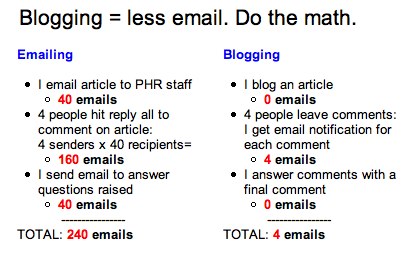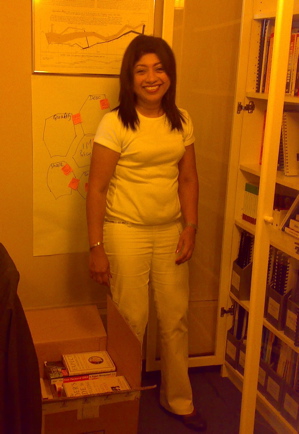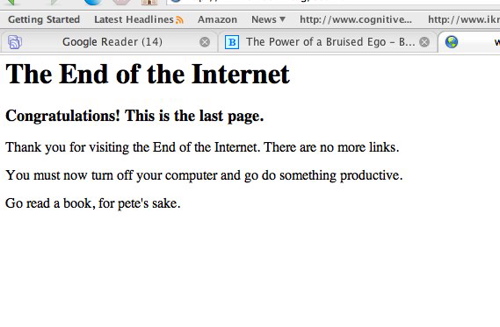Feb 04
Corporate Alzheimers
I was taken by this throwaway line from David Weinberger’s tongue in cheek post on the Netherlands monarchy, The ROI of Le Roi:
“Her involvement in politics for the last 28 years has given the government a ‘collective memory’ for our democracy.”
This reminded me of a conversation I had with Graham Durant-Law a few years ago, here he pointed out that his firm effectively works as the outsourced memory for one of their major clients, because the staff turnover there is so rapid. We have found ourselves in a similar position with multi-year KM projects – in one organisation we are working with the third generation of the client’s internal KM team.
This is obviously a widespread risk. Lim Soo Hoon, the Permanent Secretary of Singapore’s Public Service Division recently made a speech where she reported that she had been at an ASEAN gathering that had last taken place ten years’ before. Her team had been very reliant on the public servants who had been involved in the last gathering a decade before – but the worry she expressed is that it’s no longer possible to rely on public servants being around for decades. There’s increasing mobility in and out of the public service.
In our work we come across the same thing all the time with government agencies that manage slow moving policies or infrastructures – such as tax policies, public infrastructure such as dams, or large processing plants. When major changes are required, it’s again on the scale of decades, and there’s never enough documented context to recall the rationales for why particular decisions were made in particular ways. And this can have important consequences, if changes are made blindly. When NASA wanted to reuse the technology for the Saturn rockets it had developed for the Moon missions in the 1960s, they found they didn’t have any engineers who could interpret the assumptions and the science behind the documented drawings and specifications. The engineers of the 1980s and 1990s had lost their common ground with the previous generation a quarter of a century before – their engineering education and experience was radically different.
This memory loss has always happened of course – but it starts to matter when two things happen: when generations of workers get shorter, and when decisions are revisited at intervals of several generations. Each factor amplifies the effect of the other. Not all memory needs to be protected on a scale of worker-generations, but in most organisations some things do. And it matters that we identify and protect those areas of critical long term memory. How do we do that? Relying on consultants is risky. What would serve the function of the Netherlands monarchy? Do we need an officially recognised function of corporate memorialist?

Feb 01
Pitch + Politics = Commitment
Sometimes I get a really strong sensation that there’s a wrinkle in the space-time continuum, or some kind of wormhole in the blogosphere that leaks surreal situations from an entirely different (but definitely nonhuman) existence paralleling ours – like this, from Harvard Business Review blogger Marshall Goldsmith on what middle managers need to do to increase employee commitment:
”• Prepare their elevator speech, which includes the two or three key points they wish to make with their co-workers.
• Communicate this message initially to people who are known to agree with this position. Managers have to strategize to increase their influence through sheer numbers and by creating allies of people with greater influence and power.
• Finally, you need to collaborate with allies. Effective collaboration doesn’t always happen organically between like-minded people. You’d be wise to follows some specific steps:
1) Prepare a case documenting the major financial gains that will be achieved when employees are enthusiastic and involved.
2) Get a sufficient number of executives on board to begin taking action. You don’t need full-scale buy-in to get started, just enough allies to create real movement.
3) Identify some initial easily achieved targets where success will energize the change process and help you gain more allies.”
Now here’s a thing. The advice looks sincere. It’s not April Fool’s Day. It’s from Harvard for goodness’ sake. But it feels utterly and completely WRONG – like skin-crawlingly wrong. What alien race does it apply to? Luis Bunuel is dead, right?
Jan 31
Enterprise 2.0 Should Be Leaky

David Wilcox has been thinking about how the 27,000 members of the Royal Society for the Arts can use social media to collaborate online. He makes the very good point, following a thought-provoking post recently by Ed Mitchell that community boundaries are now often very porous, and that not all collaboration can be contained within the fixed boundaries of the community.
This chimed very strongly with a conversation I had last week with David Gurteen about adoption of social media inside the enterprise (the video podcast should be out in a couple of weeks). We concluded two main things: first, that web 2.0 tools will be more effective inside the enterprise if they are adopted as a clutch of tools – they provide interlocking and mutually reinforcing capabiities. Single-tool implementations are not likely to go far. (This fits Thomas Vander Wal’s view of the social software stack).
Jan 30
Common Sense vs Control
In this fiery and eloquent presentation for TED, Larry Lessig tells three stories about how the web has primed the return to a participative culture as opposed to a broadcast-passive consumption culture; and how the culture of control still holds on to control, contrary to common sense. Lessig is discussing ownership and use of content on the web, and intellectual property, but I believe that the underlying theme is directly relevant to the adoption of participative knowledge use in organisations – and the resistance to that adoption on the basis of a need for control.
Jan 29
Howard Rheingold Videos on Using Social Media
Howard Rheingold is video-blogging how he uses social media. There are three episodes out so far: the first (embedded below) sets the context of how he first got into socialising online twenty (yes, twenty) years ago (with some fascinating photographic memories!); the second discusses how he “hunts and gathers” information online via blogs and RSS; the third looks at how he stores his memories of what he finds through social bookmarking. This is s step up from the Commoncraft videos which though nice, only present the basic idea behind different social media tools. Howard sets them into a context and not only explains how he uses them in tutorial fashion, but also how they are useful to him, and why.
Thanks to Thomas Vander Wal for this!
Jan 28
Blogs Can Calm the Raging Sea

Benjamin Greenberg of non profit organisation Physicians for Human Rights has posted a really good presentation onto Google Docs that he developed internally to explain the benefits and the hows of internal blogging. I really like the email argument on the slide pasted here. The more we can siphon off the non-time sensitive stuff into channels that are more suited to them, the more we’ll be able to calm the raging torrent of email that threatens to drown us. And don’t forget to click through on the “review” link on the last slide – a nice reminder of how simple this should be.
There are other ways that blogs are better than emails for collaboration, of course – for example, if most of your team collaboration is by email, when team members come and go, new people don’t have a common point of reference for what went on before they arrived. Blogs enable them to gather context quickly. But I like the straightforward simplicity of this presentation.
Thanks to Beth Kanter for this find.
Jan 25
Apocalyptic Edge
I’ll be guest blogging over at the Cognitive Edge website for two weeks from Monday, so it may be a little quiet here (unless I can get Paolina and Edgar to keep things humming).
I plan to explore the serious topic of what happens when we fail in what we do, and when we find ourselves working with failing organisations; I want to do this through the theme of the Apocalypse, and specifically, the four horsemen of the Apocalypse, Pestilence, War, Famine and Death. You can expect next week to be rather dark, but we’ll turn to more hopeful themes in week 2.

Jan 24
Oh Paolina
So last night I was sitting quietly in our meeting room laptopping away on the sofa when Paolina came in and said “I’ve been offered a job.” Turns out she’s been offered a really good, very exciting post with a university to set up their digital library. And she’s going to take it.
I’m a Pisces so I’m allowed to have mixed feelings. The first set of feelings are around loss – Paolina is quite possibly the best recruitment decision I have made (I had help from Edgar). She has been a perfect complement to Edgar and I in our small team of three at Straits Knowledge over the past two years: she’s sunny where we are taciturn, she gets on and does things but makes sure we are all in tune; she “gets” the need to focus on the outcome for the client, even when this means going the extra unanticipated mile (or ten); she brings deep knowledge of the Singapore public sector where we do a lot of work, and also of process and project management.
But I’m also pleased. This is a very good job she’s been offered, and Straits Knowledge has evidently been good for her career. We’ve made a positive contribution, and I don’t doubt that as an alumnus of Straits Knowledge she’ll be a strong friend and advocate. Paolina misses being on the “inside” and working directly on things as opposed to being on the “outside” and advising and helping on things (that’s probably why she is such an excellent consultant). And nobody stays forever, right?
At the moment, the loss feelings are dominating. In a way, Paolina has queered the pitch for immediately going out and hunting for a successor. How could we hope to get anyone as good? Paolina’s here till the end of February, and Edgar and I can cope with the projects currently on hand, so we’ll probably take our time, until we get over our post-Paolina depression.
The photo, by the way is Paolina packing for our office move, not to depart immediately. And she’s not as happy as she looks. Honest.

Jan 24
Can We Learn Without Getting Bruised?
A very good post today from Joshua Porter on tough-to-take feedback – it’s entitled “The Power of a Bruised Ego”. Not everyone can take strong negative feedback, and too much bruising can be counter-productive, but neither should we be molly-coddlers. From the post:
“Sometimes the only way to make the necessary changes is to take a direct hit to the ego. It hurts, but boy is it effective.”
Jan 24
I Too Have Been to the End of the Internet
Last night, quite late, I reached this page. The advice it offered seemed quite wise, so I complied. Let me know if you want to know where it is.

